Gary Palmer introduces bill to allow states to require proof of citizenship for voter registration

On Friday, Congressman Gary Palmer (R-AL06) reintroduced the Citizen Ballot Protection Act to promote election security. The legislation would allow states to require proof of citizenship for voters by amending the National Voter Registration Act (NVRA). “Restoring faith in the ability to conduct free and fair elections in this country begins with cleaning up voter rolls and requiring proof of citizenship to prevent illegally cast ballots from swaying elections,” said Rep. Palmer. “I introduced the Citizen Ballot Protection Act because Americans deserve to know their elections are secure. It is common sense that states should be able to require proof of citizenship to ensure only citizens are voting in their elections. Unfortunately, a 2013 Supreme Court ruling prevents states from requiring proof of citizenship to vote in federal elections. This bill will fix the problem by amending the National Voter Registration Act of 1993 to give states the ability to verify the citizenship status of their voters when they register.” Cosponsors of the Citizen Ballot Protection Act include Rep. Chuck Edwards (R-North Carolina), Rep. Andrew Clyde (R-Georgia), Rep. Randy K. Weber (R-Texas), Rep. Clay Higgins (R-Louisiana), Rep. Jeff Duncan (R-South Carolina), Rep. Dan Crenshaw (R-Texas), Rep. Mike Bost (R-Illinois), and Rep. Andy Biggs (R-Arizona). Palmer previously introduced this legislation in 2022. Palmer is concerned about the growing push to let non-citizens vote, especially in some liberal states where non-citizens are allowed to register. New York City even approved legislation allowing non-citizens to vote in local elections. That legislation was ruled unconstitutional by the New York Supreme Court. Many states are adding proof of citizenship requirements to strengthen voter roll integrity before someone can register to vote. However, this protection does not extend to voters that register through the National Voter Registration Act (NVRA) federal mail voter registration application form. This federal form is used to register to vote in federal elections, and the information collected by the form is listed in the NVRA. Because proof of citizenship is not listed as an option to add to the form, in Arizona v. Inter Tribal Council of Arizona, the Supreme Court held a state requirement to show proof of citizenship to register to vote in federal elections violates the NVRA. Without the proof of citizenship requirement, individuals must only attest under penalty of perjury that they are citizens. The Citizen Ballot Protection Act would amend the National Voter Registration Act to clarify that a state may impose a proof of citizenship requirement to register to vote in a federal election. The bill does not force states to require proof of citizenship but instead respects and upholds the role of states in administering federal elections. It merely gives states the option to add more security to their voter registration process. It helps states with proof of citizenship requirements streamline their registration process so that both their version of the federal mail voter registration form and the state’s regular voter registration form can have the same review process. State modifications to the federal mail voter registration form are reviewed by the U.S. Election Assistance Commission (EAC). The EAC and courts have begun interpreting the prohibition of notarized or other formal authentications as justification for denying states the ability to require documentary proof of citizenship with the federal mail voter registration form. In 2021, the United States District Court for the District of Columbia ruled that a previous 2016 EAC approval for Alabama, Georgia, and Kansas to include proof of citizenship violated the Administrative Procedures Act. The 10th Circuit issued a ruling in 2014 upholding EAC’s original rejection of Arizona and Kansas’ request that the federal form include documentary proof of citizenship. Gary Palmer is serving in his fifth term representing Alabama’s Sixth Congressional District. To connect with the author of this story or to comment, email brandonmreporter@gmail.com.
Senators propose changes to electors law after Capitol riot

A bipartisan group of senators agreed Wednesday on proposed changes to the Electoral Count Act, the post-Civil War-era law for certifying presidential elections that came under intense scrutiny after the January 6 attack on the Capitol and Donald Trump’s effort to overturn the 2020 election. Long in the making, the package introduced by the group led by Sens. Susan Collins of Maine and Joe Manchin of West Virginia is made up of two separate proposals. One would clarify the way states submit electors and the vice president tallies the votes in Congress. The other would bolster security for state and local election officials who have faced violence and harassment. “From the beginning, our bipartisan group has shared a vision of drafting legislation to fix the flaws of the archaic and ambiguous Electoral Count Act of 1887,” Collins, Manchin, and the other 14 senators said in a joint statement. “We have developed legislation that establishes clear guidelines for our system of certifying and counting electoral votes,” the group wrote. “We urge our colleagues in both parties to support these simple, commonsense reforms.” Both Senate Majority Leader Chuck Schumer and Senate Republican leader Mitch McConnell have signaled support for the bipartisan group, but the final legislative package will undergo careful scrutiny. Votes are not likely before fall. But with broad support from the group of 16 senators, seven Democrats and nine Republicans, who have worked behind closed doors for months with the help of outside experts, serious consideration is assured. In a statement, Matthew Weil, executive director of the Democracy Program at the Bipartisan Policy Center, called the framework a “critical step” in shoring up ambiguities in the Electoral Count Act. After Trump lost the 2020 election, the defeated president orchestrated an unprecedented attempt to challenge the electors sent from battleground states to the joint session of Congress on January 6, when the vice president presides over certification. Under the proposed changes, the law would be updated to ensure the governor from each state is initially responsible for submitting electors, as a way to safeguard against states sending alternative or fake elector slates. Additionally, the law would spell out that the vice president presides over the joint session in a “solely ministerial” capacity, according to a summary page. It says the vice president “does not have any power to solely determine, accept, reject, or otherwise adjudicate disputes over electors.” That provision is a direct reaction to Trump’s relentless efforts to pressure then Vice President Mike Pence to reject the electors being sent from certain battleground states as a way to halt the certification or tip it away from Joe Biden’s victory. The bill also specifies the procedures around presidential transitions, including when the election outcome is disputed, to ensure the peaceful transfer of power from one administration to the next. That’s another pushback to the way Trump blocked Biden’s team from accessing some information for his transition to the White House. The second proposal, revolving around election security, would double the federal penalties to up to two years in prison for individuals who “threaten or intimidate election officials, poll watchers, voters or candidates,” according to the summary. It also would seek to improve the way the U.S. Postal Service handles election mail and “provide guidance to states to improve their mail-in ballot processes.” Mail-in ballots and the role of the Postal Service came under great scrutiny during the 2020 election. An Associated Press review of potential cases of voter fraud in six battleground states found no evidence of widespread fraud that could change the outcome of the election. A separate AP review of drop boxes used for mailed ballots also found no significant problems. The need for election worker protections was front and center at a separate hearing Wednesday of the House Committee on Homeland Security. Election officials and experts testified that a rise in threats of physical violence is contributing to staffing shortages across the country and a loss of experience at local boards of elections. “The impact is widespread,” said Neal Kelley, a former registrar of voters in Orange County, California, who now chairs the Committee for Safe and Secure Elections. “And, while the effects on individuals are devastating, the potential blow to democracy should not be dismissed.” Elizabeth Howard, senior counsel at the Brennan Center for Justice, told the committee that Congress needs to direct more money and support toward protecting election workers’ personal safety, including by funding local and federal training programs and providing grants to enhance security at election directors’ personal residences. Democratic New Mexico Secretary of State Maggie Toulouse Oliver, who recently reported a series of threats, told the panel the situation has become worse after former President Donald Trump’s attacks against the 2020 election result. “Unfortunately, we are still on a daily basis, in my state and across the country, living with the reverberating effects of the ‘Big Lie’ from 2020,” she said. “And, as we all know, when it comes to leadership, what you say from the very highest echelons of government power in this country do have those reverberating effects.” Some Republican members of the committee condemned violence against election workers — and also drew a parallel to recent threats and intimidation directed toward some Supreme Court justices after their decision to overturn constitutional protections for abortion. GOP Rep. Clay Higgins of Louisiana rejected the notion that Trump and other election skeptics were solely responsible for the “atmosphere of mistrust” that grew up around the 2020 election. Republished with the permission of The Associated Press.
Barry Moore joins lawmakers demanding hearing over treatment of January 6 defendants
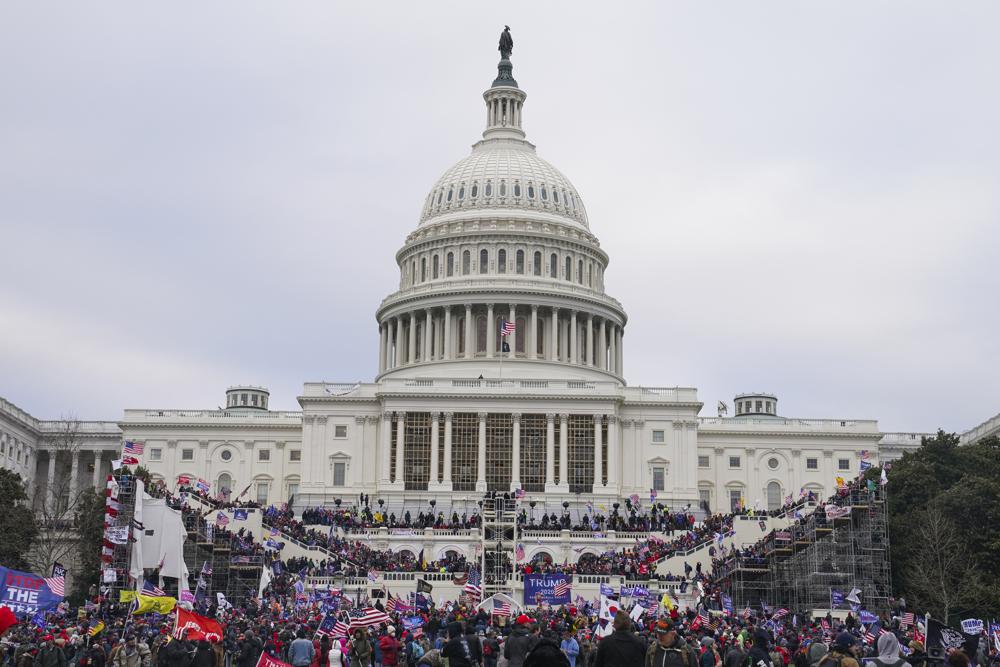
Rep. Barry Moore, along with 20 colleagues, sent a letter to Chairman Jerry Nadler and Chairwoman Carolyn Maloney asking that House Judiciary and House Oversight & Reform Committees hold hearings on the treatment of January 6 defendants being held at the D.C. Department of Corrections. The letter states that the defendants are being held in solitary confinement and are not being given needed medical treatment. U.S. District Judge Royce C. Lamberth asked the Department of Justice to conduct a civil rights investigation into the conduct of the D.C. jail regarding a patient who needed treatment for non-Hodgkins. Lamberth stated, “It’s clear to me the civil rights of the defendant were violated by the D.C. Department of Corrections.” “Regardless of the charges an incarcerated person faces, correctional authorities should respect and uphold their civil rights and protect their health and safety. In this country, they have the presumption of innocence. They have not faced trial. And even convicted criminals should get adequate medical care and proper food. They are human beings. The reports coming out of the D.C. Department of Corrections are deeply concerning, and Congress should use our oversight authority to investigate,” said Rep. Moore. Moore stated on Twitter, “Regardless of the charges and incarcerated person faces, correctional authorities should respect and uphold their civil rights & protect their health & safety. In this country they have the presumption of innocence.” “There is clear mistreatment of the individuals being held in the D.C. jail for charges related to January 6th,” stated Biggs. “There is NO excuse for keeping them in these abhorrent conditions and continuing to impose solitary confinement – a punishment that even some on the Left have condemned. It’s time for Chairman Nadler and Chairwoman Maloney to set aside any political motivations, do their job, and hold hearings so that we can get to the bottom of this.” Reps. Marjorie Taylor Greene and Mary Miller expressed disapproval for Deputy Warden Kathleen Landerkin’s actions. Rep. Greene stated, “The atrocious and inhumane conditions for PRE-TRIAL detainees at the D.C. Gulag are a clear example of the two-tiered justice system in America. BLM / Antifa domestic terrorists are allowed to walk free after burning down our cities with violent riots, but suspected J6 defendants are subjected to worse treatment than convicted terrorists in Gitmo. This situation must be investigated, and the officials responsible must be terminated from their positions, starting with avowed Trump-hater Deputy Warden Kathleen Landerkin.” “Deputy Warden Landerkin is using her position to torture her political opponents in a system where justice is supposed to be blind,” stated Miller. “There is clear mistreatment of the individuals being held in the D.C. jail for charges related to January 6th,” stated Andy Biggs. “There is NO excuse for keeping them in these abhorrent conditions and continuing to impose solitary confinement – a punishment that even some on the Left have condemned. It’s time for Chairman Nadler and Chairwoman Maloney to set aside any political motivations, do their job, and hold hearings so that we can get to the bottom of this.” The letter was also signed by Scott Perry, Jeff Duncan, Lauren Boebert, Andy Biggs, Debbie Lesko, Andy Harris, Randy Weber, Bill Posey, Russ Fulcher, Matthew Rosendale, Sr., Louie Gohmert, Andrew Clyde, Mary Miller, Marjorie Taylor Greene, Jody Hice, Matt Gaetz, Bob Good, Michael Cloud, Ralph Norman, and Clay Higgins.
Members of Congress call on Joe Biden to resign, calling him ‘unfit’
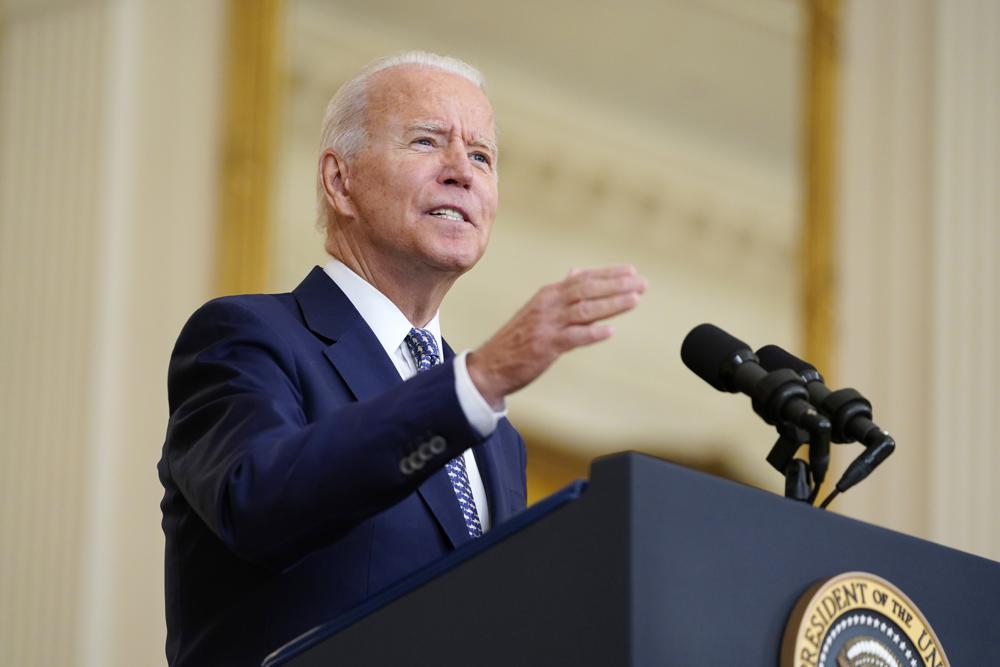
Alabama legislators have continued to call on President Joe Biden’s resignation following the recent events in Afghanistan. Last week, suicide bombers and gunmen attacked Kabul airport killing 60 Afghans and 13 U.S. troops. The Islamic State group claimed responsibility for the killings. Critics blame Biden and a lack of leadership for the chaos that occurred at the end of a planned evacuation of Afghanistan. Former President Donald Trump earlier agreed in negotiations with the Taliban to end the war in May. However, Biden waited until the Taliban had swept to power this month, following the collapse of the U.S.-backed government and its army, to begin executing an airlift, reported the Associated Press. Rep. Jerry Carl cosponsored a resolution calling for Biden’s resignation. The resolution was introduced by Clay Higgins. Carl stated, “President Biden’s leadership failures have directly resulted in 13 U.S. servicemembers being killed at the hands of brutal terrorists, Americans being stranded abroad, our nation’s reputation being humiliated on the world stage, and the Taliban seizing billions of dollars of U.S. military equipment. A majority of Americans no longer have confidence in the President’s ability to lead our nation and serve as our Commander in Chief. President Biden must resign immediately.” Last week, Rep. Mo Brooks called for Biden’s resignation stating, “President Joe Biden had an obligation to safely and securely remove American assets and citizens from Afghanistan. Instead, Biden left the Taliban and terrorist entities with inordinate control over American lives, American military equipment, and American military personnel, thereby putting them all at risk.” On Twitter Brooks wrote, “President Joe Biden has failed as Commander-In-Chief. President Biden is unable to meet the challenges of a President of the United States. He is mentally unfit to hold the Presidency.” Today, Rep. Barry Moore released a statement calling for President Joe Biden to resign. “Today is a painfully dark day in our nation’s history, and we are all experiencing a whirlwind of emotions as we helplessly watch the deadly situation in Afghanistan continue to deteriorate. I ask all Americans to join me in praying for our countrymen and allies still trapped on the ground in Afghanistan. The United States has been delivered through many crises in our history, and I believe we will be again. “Unfortunately, President Biden’s stubborn refusal to take accountability for this deadly crisis and his inexplicably cavalier attitude toward this low point in American history gives me no confidence that this Administration possesses the leadership or priorities necessary to salvage this disastrous retreat and rescue either our stranded Americans or global reputation. It is abundantly and agonizingly clear that drastic changes are needed throughout this Administration – beginning at the top. President Biden must acknowledge that he is not up to the task of serving as Commander-in-Chief of the greatest country in the free world, and he must step aside and allow new leadership to guide the United States through these perilous times.”
Congress approves bill to make Juneteenth a federal holiday; Mo Brooks and Mike Rogers voted against
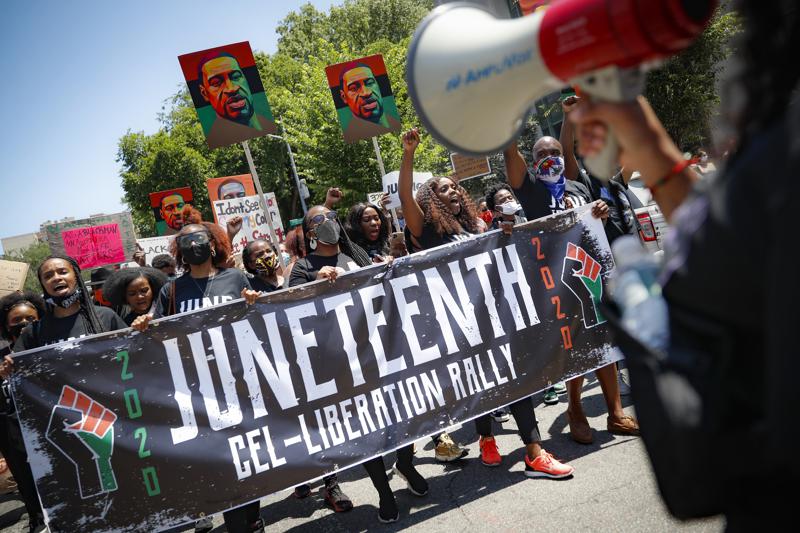
The United States will soon have a new federal holiday commemorating the end of slavery in the nation. The House voted 415-14 Wednesday to make Juneteenth, or June 19th, the 12th federal holiday. The bill now goes to President Joe Biden’s desk, and he is expected to sign it into law. Juneteenth commemorates the day the last enslaved African Americans learned they were free. Confederate soldiers surrendered in April 1865, but word didn’t reach the last enslaved Black people until June 19, when Union soldiers brought the news of freedom to Galveston, Texas. That was also about 2 1/2 years after the Emancipation Proclamation freed slaves in the Southern states. It’s the first new federal holiday since Martin Luther King Jr. Day was created in 1983. “Our federal holidays are purposely few in number and recognize the most important milestones,” said Rep. Carolyn Maloney, D-N.Y. “I cannot think of a more important milestone to commemorate than the end of slavery in the United States.” Rep. Sheila Jackson Lee, D-Texas, speaking next to a large poster of a Black man whose back bore massive scarring from being whipped, said she would be in Galveston this Saturday to celebrate along with Republican Sen. John Cornyn of Texas. “Can you imagine?” said the rather short Jackson Lee. “I will be standing maybe taller than Sen. Cornyn; forgive me for that because it will be such an elevation of joy.” The Senate passed the bill a day earlier under a unanimous consent agreement that expedites the process for considering legislation. It takes just one senator’s objection to block such agreements. “Please, let us do as the Senate. Vote unanimously for passage,” Rep. David Scott, D-Ga., pleaded with his colleagues. The vote comes as lawmakers struggle to overcome divisions on police reform legislation following the killing of George Floyd by police and as Republican state legislators push what experts say is an unprecedented number of bills aimed at restricting access to the ballot box. While Republicans say the goal is to prevent voter fraud, Democrats contend that the measures are aimed at undermining minority voting rights. Several members of the Congressional Black Caucus took to the floor to speak in favor of the bill. Rep. Bonnie Watson Coleman, D-N.J., said she viewed Juneteenth as a commemoration rather than a celebration because it represented something that was delayed in happening. “It also reminds me of what we don’t have today,” she said. “And that is full access to justice, freedom, and equality. All these are often in short supply as it relates to the Black community.” The bill was sponsored by Sen. Edward Markey, D-Mass., and had 60 co-sponsors. Democratic leaders moved quickly to bring the bill to the House floor after the Senate’s vote the day before. Some Republican lawmakers opposed the effort. Rep. Matt Rosendale, R-Mont., said creating the federal holiday was an effort to celebrate “identity politics.” “Since I believe in treating everyone equally, regardless of race, and that we should be focused on what unites us rather than our differences, I will vote no,” he said in a press release. The vast majority of states recognize Juneteenth as a holiday or have an official observance of the day, and most states hold celebrations. Juneteenth is a paid holiday for state employees in Texas, New York, Virginia, and Washington. Under the legislation, the federal holiday would be known as Juneteenth National Independence Day. Rep. Clay Higgins, R-La., said that he would vote for the bill and that he supported the establishment of a federal holiday, but he was upset that the name of the holiday included the word “independence” rather than “emancipation.” “Why would the Democrats want to politicize this by co-opting the name of our sacred holiday of Independence Day?” Higgins asked. Rep. Brenda Lawrence, D-Mich., replied, “I want to say to my white colleagues on the other side: Getting your independence from being enslaved in a country is different from a country getting independence to rule themselves.” She added: “We have a responsibility to teach every generation of Black and white Americans the pride of a people who have survived, endured, and succeeded in these United States of America despite slavery.” The 14 House Republicans who voted against the bill were Andy Biggs of Arizona, Mo Brooks of Alabama, Andrew Clyde of Georgia, Scott DesJarlais of Tennessee, Paul Gosar of Arizona, Ronny Jackson of Texas, Doug LaMalfa of California, Thomas Massie of Kentucky, Tom McClintock of California, Ralph Norman of South Carolina, Mike Rogers of Alabama, Rosendale of Montana, Chip Roy of Texas, and Tom Tiffany of Wisconsin.
Senate approves $483B virus aid deal, sends it to House
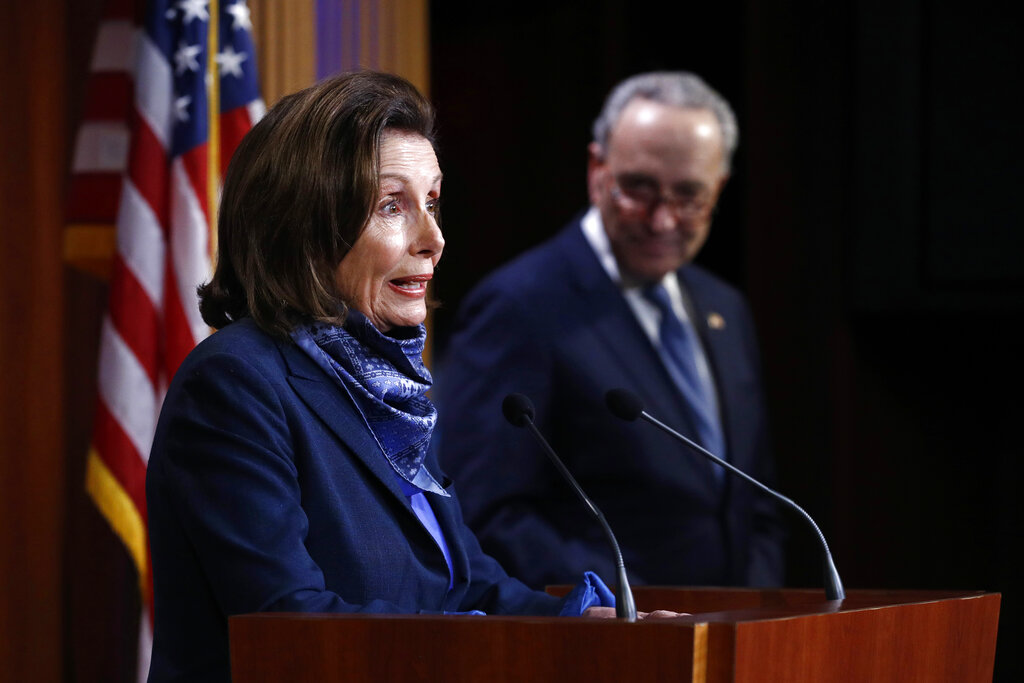
Passage was swift and unanimous, despite opposition from conservative Republicans.
Donald Trump impeached by U.S. House on 2 charges
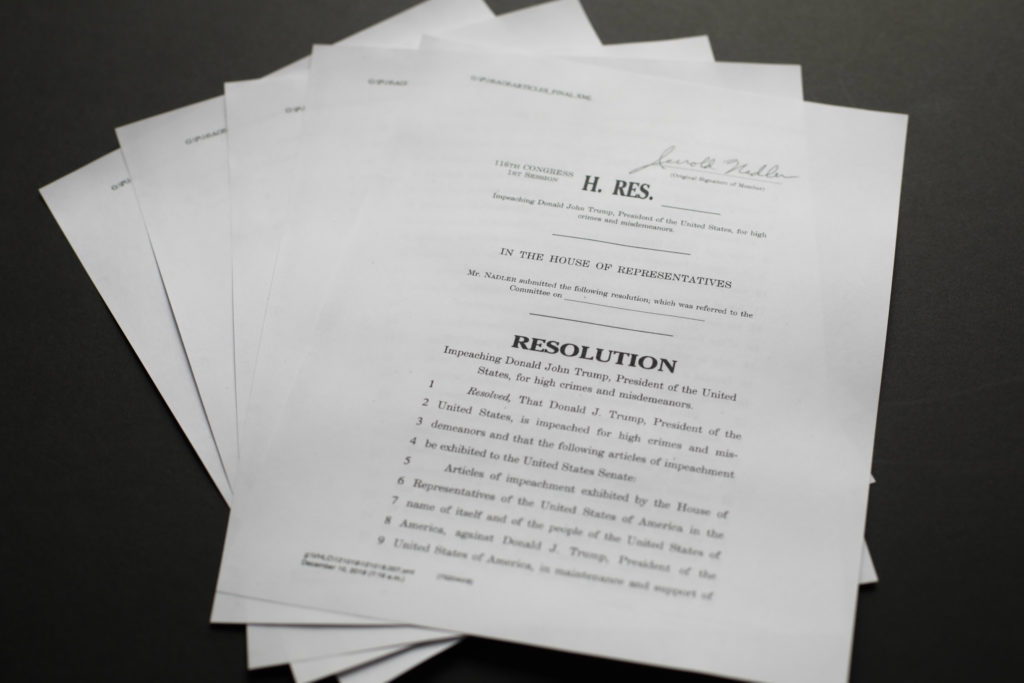
President Donald Trump was impeached by the U.S. House of Representatives Wednesday night, becoming only the third American chief executive to be formally charged under the Constitution’s ultimate remedy for high crimes and misdemeanors. The historic vote split along party lines, much the way it has divided the nation, over a charge that the 45th president abused the power of his office by enlisting a foreign government to investigate a political rival ahead of the 2020 election. The House then approved a second charge, that he obstructed Congress in its investigation. The articles of impeachment, the political equivalent of an indictment, now go to the Senate for trial. If Trump is acquitted by the Republican-led chamber, as expected, he still would have to run for reelection carrying the enduring stain of impeachment on his purposely disruptive presidency. He saw the blame flowing the other direction. He told a political rally in Michigan that “crazy Nancy Pelosi’s House Democrats have branded themselves with an eternal mark of shame.” The votes were 230 for impeachment and 197 against on the first count, 229-198 on the second. Democrats led Wednesday night’s voting, framed in what many said was their duty to protect the Constitution and uphold the nation’s system of checks and balances. Republicans stood by their party’s leader, who has frequently tested the bounds of civic norms. Trump called the whole affair a “witch hunt,” a “hoax” and a “sham,” and sometimes all three. The trial is expected to begin in January in the Senate, where a vote of two-thirds is necessary for conviction. While Democrats had the majority in the House to impeach Trump, Republicans control the Senate and few if any are expected to diverge from plans to acquit the president ahead of early state election-year primary voting. Pelosi, once reluctant to lead Democrats into a partisan impeachment, gaveled both votes closed, risking her majority and speakership to follow the effort to its House conclusion. “Today we are here to defend democracy for the people,” she said earlier during floor debate. Trump, who began Wednesday tweeting his anger at the proceedings, pumped his fist before an evening rally in Battle Creek, Michigan, boasting of “tremendous support” in the Republican Party and saying, “By the way it doesn’t feel like I’m being impeached.” No Republicans voted for impeachment, and Democrats had only slight defections on their side. Voting was conducted manually with ballots, to mark the moment. On the first article, abuse of power, two Democrats, Rep. Jeff Van Drew of New Jersey, who is considering switching parties to become a Republican, and Rep. Collin Peterson of Minnesota voted against impeaching Trump. On the second article, obstruction, those two and freshman Rep. Jared Golden of Maine voted against. Democratic Rep. Tulsi Gabbard of Hawaii, who is running for president, voted “present” on both. What Pelosi called a sad and solemn moment for the country, coming in the first year that Democrats swept control of the House, unfolded in a caustic daylong session that showcased the nation’s divisions — not only along party lines, but also by region, race and culture. The House impeachment resolution laid out in stark terms the two articles of impeachment against Trump stemming from his July phone call when he asked the Ukraine president for a “favor” — to announce it was investigating Democrats ahead of the 2020 election. He also pushed Ukrainian President Volodymyr Zelenskiy to probe unsubstantiated corruption allegations against Joe Biden, the former vice president and 2020 White House contender. At the time, Zelenskiy, a young comedian newly elected to politics, was seeking a coveted White House visit to show backing from the U.S. ally as it confronts a hostile Russia at its border. He was also counting on $391 million in military aid already approved by Congress. The White House delayed the funds, but Trump eventually released the money once Congress intervened. Narrow in scope but broad in its charge, the resolution said the president “betrayed the nation by abusing his high office to enlist a foreign power in corrupting democratic elections,” and then obstructed Congress’ oversight like “no president” in U.S. history. “President Trump, by such conduct, has demonstrated that he will remain a threat to national security and the Constitution if allowed to remain in office,” it said. Republicans argued that Democrats are impeaching Trump because they can’t beat him in 2020. “This vote is about one thing, and one thing only: They hate this president,” said Rep. Chris Stewart, R-Utah. “They want to take away my vote and throw it in the trash.” But Democrats warned the country cannot wait for the next election to decide whether Trump should remain in office because he has shown a pattern of behavior, particularly toward Russia, and will try to corrupt U.S. elections in 2020. “The president and his men plot on,” said Chairman Adam Schiff, Democrat-California, of the Intelligence Committee that led the inquiry. “The danger persists. The risk is real.” The outcome brings the Trump presidency to a milestone moment that has building almost from the time the New York businessman-turned-reality-TV host unexpectedly won the White House in 2016 amid questions about Russian interference in the U.S. election — and the rise of the “resistance.” Democrats drew from history, the founders and their own experiences, as minorities, women and some immigrants to the U.S., seeking to honor their oath of office to uphold the constitution. Rep. Lou Correa, Democrat-California, spoke in Spanish asking God to unite the nation. “In America,” said Rep. Hakeem Jeffries, Democrat-New York, “no one is above the law.” Republicans aired Trump-style grievances about what Arizona Rep. Debbie Lesko called a “rigged” process. “We face this horror because of this map,” said Rep. Clay Higgins, Republican-Alabama, before a poster of red and blue states. “They call this Republican map flyover country, they call us deplorables, they fear our faith, they fear our strength, they fear our unity, they fear our vote, and they fear our president.” The political fallout from the


